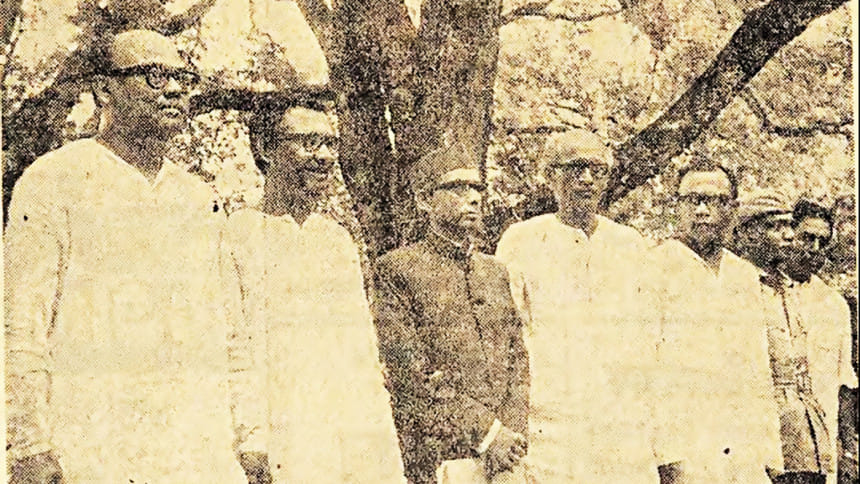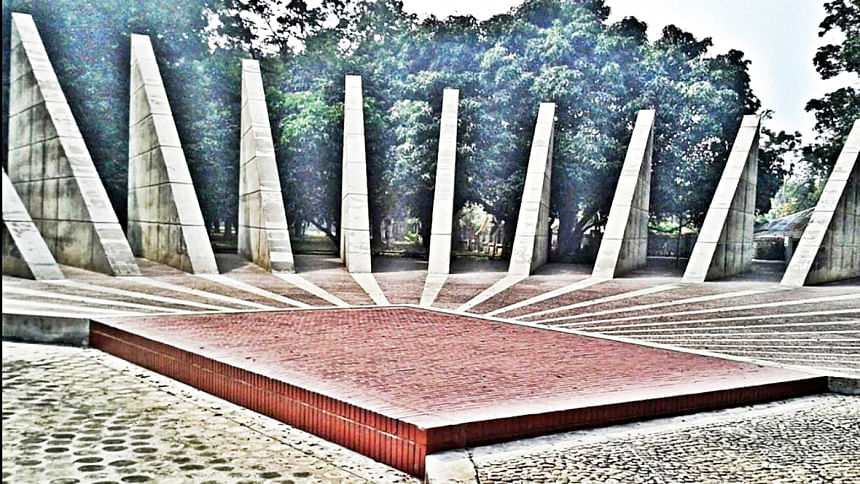Honouring Mujibnagar heroes

April 17, 1971, is a historic day that shines brightly in the collective memory of Bangladesh with immense pride, unwavering strength, and boundless enthusiasm. It marks the moment when the world witnessed the birth of a free Bangladesh on the global stage. In a small, uncharted corner of the newly emerged Bangladesh, countless remarkable and unexpected events unfolded. Thousands of people gathered with a resolute purpose, laying the political, constitutional, and geographical foundation of our newfound state. This day remains an indelible beacon in the annals of history, cherished by those who contributed to its creation. It also symbolizes the invaluable support of our friendly neighbor, India, in our journey towards existential glory.
The Indian Border Security Force (BSF) provided crucial assistance, including deploying urgently needed security measures, to thwart any potential incursion from Pakistan during the Oath Taking Ceremony. This was made possible through the strategic decisions orchestrated by Indira Gandhi, facilitated by Khusro Faramuz Rustamji, the DG of BSF. The entire West Bengal BSF, led by Inspector General Golok Majumder, played a pivotal role in this effort. Following Golok Majumder's instructions, Mr. Chakraborty, the Commanding Officer of BSF in Twenty Four Parganas, and his subordinate Captain Mohapatra, were deputed to guard the VIPs in the Bodyanathtala of Meherpur, disguised in civilian clothes with concealed weapons. Captain Manindra Singh Rathore of the 18th Indian BSF battalion, under the command of Colonel Megh Singh, led the security arrangement at the venue.
Allow me to recount the remarkable tale of Captain Manohar, his commanding officer Colonel Megh Singh, and their battalion 18 BSF, whose unwavering courage and dedication made a monumental contribution to the liberation war.
Assistant Commandant (Captain) Manohar Singh Rathore was a young and dynamic officer of 18 Battalion BSF. Since he had previously participated in the 1965 war in the Gurkha Regiment, his CO Lt. Col. Megh Singh appointed him as Company Commander and Mortar Platoon Commander of 18 BSF Battalion. His company, along with the Mortar platoon, was initially deployed at Meherpur to provide protection and fire support during the swearing-in ceremony of the 1st Independent Government of Bangladesh on 17th April 1971, and later at Petrapol-Benapole area.
Captain Rathore witnessed and provided protection to the Oath taking ceremony dressed as a Bangladeshi Muktijodha personnel in civilian clothes as per the direction of their CO, Lt Col. Megh Singh (who was also there with Maj. Hafiz).
I recall a conversation I had with someone who appeared to be Capt. Rathore, possibly from 18 BSF Battalion. He was wearing a whitish maroon kurta and salwar. I asked him, "Bhai, aap idhar kyu? Aap to Indian Army ke lagte ho". He replied, "Mein 18 BSF Battalion ka hu aur mere ko yaha mere CO, Col. Megh Singh ne bheja hai". I was inquisitive and asked, "Aap yaha kya kar rahe ho"? He replied, "Hum log idhar VIP logon ko safety dene ke liye charon taraf deployed hai. Idhar Bangladesh ka swearing-in hogi, to hum sab Pakistan attack ko nahi hone dene ke liye deployed hai. Hamari Battalion yaha civilian kapde mein deployed hai". I replied to him, "Bahut shukriya aap ko, hum bhi yaha hai aur Mukti Bahini Pakistani ko dekh lega." We saluted each other and went on to our respective work. I couldn't see his personal arms, and he was wearing jungle shoes. Later, after the ceremony, I met Capt Mohapatra, who was the BSF company commander at the nearest BSF post at Changkhali, and whom I had met earlier as well. He told me that 18 BSF Battalion was providing protection at the venue of the ceremony dressed as Mukti Bahini in civilian clothes.
Capt. Manohar was subsequently deployed with his company at Petrapol-Benapole ICP, providing protection to the Bangladesh flag hoisted after the April 17, 1971 ceremony, by ensuring and assisting all defensive deployments of Mukti Bahini in the area. During the months of April and May 1971, the company supported Major Hafiz of 1st East Bengal Regiment in conducting a raid on April 21 on a Pakistan Army artillery gun position at Navaron, approximately 13 kilometers inside East Pakistan territory.

Major Hafiz narrates in his book about the raid and how the Muktijodhas of 1st EBR were provided with effective mortar fire to safely withdraw after the successful raid.
As the mortars were firing and it was raining heavily, the 18 BSF troops could not retrieve the two base plates from the fire position after the raid. Once the entire party reached back safely at Benapole and were being debriefed by Lt. Col. Megh Singh, it was learned that the base plates were left behind by the mortar detachments while exfiltrating in a hurry under heavy Pakistani fire. Despite knowing the gravity of the situation and the possibility of Pakistani soldiers being alert in the area, Capt. Manohar volunteered to take a few boys and retrieve the base plates.
According to Maj. Hafiz, this was a daring operation inside enemy territory, knowing fully well that the enemy was dominating that particular area. Notwithstanding, Capt. Manohar reached the firing position again at night by infiltrating from a different direction, dug out the base plates, and exfiltrated back to Benapole around first light. This was among the most daring operations deep inside enemy territory by the 18 BSF Battalion.

The Petrapol Company of 18 BSF Battalion was instrumental in providing security to many top Bangladeshi freedom movement leaders, including the Prime Minister Tajuddin Ahmad, Acting President Nazrul Islam, and the military Commander-in-Chief Lt. Col. MAG Osmani, during their meetings/briefings at the Benapole ICP where the Bangladesh flag was flying with its safety and security ensured by 18 BSF Battalion. It was ensured that the Bangladeshi flag would keep flying high till the end of the liberation war. In addition, many Indian media personnel and international journalists frequently visited this place.
On the nights of 23-24 April and 8-10 May 1971, the Pakistan Army attacked Benapole from the North (Kagajpukur side). Captain Manohar Rathore was among the few Indian officers who fought alongside the Mukti Bahini as a muktijoddha, dressed in a lungi and shirt during the attack, and did not allow the enemy to cause any damage to the Bangladeshi Flag.
In addition, Major Hafiz also narrated the incident involving Lieutenant Colonel Megh Singh and how he replied to the Eastern Army Commander during his many visits to Benapole when he wanted the 1st EBR to withdraw and reorganize itself and train for future operations. As claimed by Major Hafiz, Lieutenant Colonel Megh Singh told the Army Commander, "Sir, I have given my word of honor to my Bangladeshi friends (Dr. Tawfiq Elahi, Major Hafiz, and Mahbub Uddin were all there) that the Bangladeshi Flag will keep flying high at Benapole and it will only come down over my dead body."

In addition, personnel from the 18 BSF Battalion also conducted many daring raids against the Pakistan Army to capture their weapons and inflict casualties, dressed as Mukti Bahini in lungi and shirt or Punjabi suit, in areas along the Rd Benapole-Navaron-Jhikargacha-Jashore to provide depth and security to the ICP throughout the nine months of the liberation war.
Capt. Manohar of the 18 BSF Battalion became the custodian of the money collected by this author and Dr. Tawfiq Elahi, SDO for more than a month before it was eventually handed over to the Government of Bangladesh. The keys had been kept with Maj Usman Chaudhary, the Sector Commander of Bangladesh forces, and the room was under the safe protection of the Petrapol Company of the 18 BSF Battalion. All of this was possible due to the dynamic leadership of Lt. Col. Megh Singh, who was willing to contribute as much as possible to the Freedom Fighters of Bangladesh in their liberation war effort.
18 BSF Battalion later moved out from Benapole when the Indian offensive commenced in December 1971 to the Western borders and were airlifted to Jaisalmer. Capt. Manohar was awarded the highest Gallantry Award given to the Paramilitary Forces called the President's Police Medal for Gallantry in 1972 for his actions in the Eastern Sector which had resulted in the elimination of 40-50 Pakistan Army personnel in the nine-month long deployment at Petrapol-Benapole ICP area during the Liberation war. The 18 BSF Battalion was deployed in Petrapol on 28 March 1971 and remained closely associated with all the activities that happened west of Jashore during the nine-month long liberation war.
I urge the Government of Bangladesh to recognize the gallant acts of the members of the 18 BSF Battalion. They made immense contribution at the grassroots level by providing safe conduct for the swearing-in ceremony of the 1st Independent Government of Bangladesh in Mujibnagar. Their efforts in protecting the Bangladesh Flag over nine months during the liberation war at Benapole-Petrapol ICP are exemplary. Their custody of the money collected by Dr. Tawfiq and Mahbub Uddin Ahmed for 40 days contributed towards the liberation war effort in a great way. They also particated in the liberation war by conducting raids and attacks deep inside Pakistani-held territory along with the 1st EBR troops led by Maj. Hafiz.
Mahbub Uddin Ahmed Bir Bikram was in charge of presenting the guard of honour to the acting president of the government-in-exile, Syed Nazrul Islam, at the oath-taking ceremony on April 17, 1971.

 For all latest news, follow The Daily Star's Google News channel.
For all latest news, follow The Daily Star's Google News channel. 



Comments